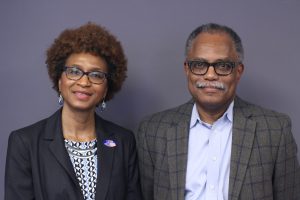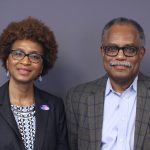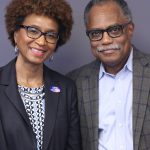Archie Willis III and Constance Dyson
Description
Archie Willis III (62) interviewed by his friend Constance Dyson [no age given] about his father A.W. Willia Jr. who was highly involved in the Civil Rights Movement, attending integrated schools, his mother's civic and volunteering work, how his childhood neighborhood of South Memphis has changed, his work for affordable housing, participating at the last march with Dr. Martin Luther King Jr., his father's founding of the National Civil Rights Museum at the Lorraine Motel, and his family's reaction to Dr. King's assassination.Subject Log / Time Code
Participants
- Archie Willis III
- Constance Dyson
Recording Locations
National Civil Rights MuseumVenue / Recording Kit
Tier
Partnership
Partnership Type
Fee for ServiceInitiatives
Keywords
Subjects
Places
Transcript
StoryCorps uses Google Cloud Speech-to-Text and Natural Language API to provide machine-generated transcripts. Transcripts have not been checked for accuracy and may contain errors. Learn more about our FAQs through our Help Center or do not hesitate to get in touch with us if you have any questions.
00:03 Hi, my name is Connie Dyson. Today's date is March 3rd 2024 at the national Civil Rights Museum in Memphis, Tennessee. I'm sitting down with Archie Willis III. He's a dear friend and Tennis partner.
00:18 My name is Archie Willis 2/3. I am 62 today's date is March 3rd 2020. We are at the national Civil Rights Museum in Memphis, Tennessee. I am sitting down with Connie Dyson who is a dear friend and my tennis partner who beats me on a regular basis.
00:38 So we've been playing tennis for God. How many do you know how many years has it been 10:00 at already? I would venture to say it probably has details in terms of my memory these days so I can't really say but I'm sure it's been at least ten years has some good points on the cord and have learned some things together absolutely certain things together between family and what's happening today. So I think it's a good chance for us to Canada as to record some part of our relationship relationship and I appreciate the friendship and camaraderie of the competition to learn more about you specifically and you know the role that you played with the museum and the community-at-large and your family to which has been quite significant.
01:37 Tell me a little bit about where you were born on Coors.
01:42 I was born in Memphis and we actually grew up in South Memphis not too terribly far from this part of downtown and spent most of my early teenage years in South Memphis before we moved out of the neighborhood and grew up as you indicated in a very actively and engage family in terms of civil rights political involvement in Civic engagement. So it's been an interesting. It's been interesting Journey. So you say if you're from Memphis, you know that South Memphis is a neighborhood that mean certain things. I'm sure miss something different back then. Can you tell me more about the neighborhood? I would say generally speaking for people like me who are my generation and maybe even a little of the one before me South Memphis hasn't really changed in terms of what we consider South Memphis. And when we encounter people that live play south of what we considered be South Memphis will let them know that they really aren't from South Memphis.
02:42 From Westwood or even some people in Whitehaven will claim South Memphis South Memphis status and no sew the neighborhood. We look at really starts with the northern edge of the Southern edge of downtown and extends probably over to kind of the person area before you get to the interstate around that area and then to the river going to the west and to the east you asked me to Parkway is going up to South Parkway East in East Parkway. We all consider that a part of a South Memphis, but the core South Memphis is probably literally within a mile of the Civil Rights Museum going to the South so draw low circle going south and that was really what I would consider to be core South Memphis some Central landmarks. I think in terms of African American history in that neighborhood to and including them the cities only HBCU the morning on College.
03:39 Stax Museum where there's a strong music tradition and that's pretty much always been the case at least in your lifetime. Right? I mean the historical significance of the communities of people who grew up in the community protect the generation before me and some of the actual physical structures are really it's a who's who list of Memphis history. Are you look at the you the hooks family this me a family look at my family all the sugar buns made the list goes on and on and on in terms of luminaries that came up out of South Memphis. Most of them went to Booker T, Washington High School, which was the first Sub City High School built for African Americans in Memphis and the legacy of the public housing developments that were they are there now being redeveloped witching you actually we are apart of and as you mentioned on the Monon College, which was and still is a Mainstay in terms of academic achievement and Excellence, but but it was even more so I think
04:39 I to the days of integration where a lot of iron African American institutions were the only options for folks who are the primary option for people so they in many cases had a greater degree of importance.



